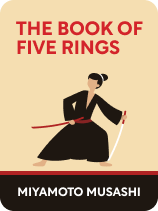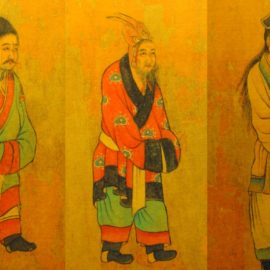

This article is an excerpt from the Shortform book guide to "The Book of Five Rings" by Miyamoto Musashi. Shortform has the world's best summaries and analyses of books you should be reading.
Like this article? Sign up for a free trial here .
What does Miyamoto Musashi teach in The Book of Water? In what ways should a samurai be like water?
In The Book of Five Rings, legendary samurai Miyamoto Musashi says that a samurai must learn to be like water. He teaches three fundamental components that a warrior must master if he wants to learn his famous sword style Niten Ichi-ryū: 1) don’t memorize, absorb, 2) train both body and mind, and 3) master yourself first.
Let’s take a look at each in detail.
The Water Book—Training Mentally and Physically for Combat
After he introduces the key elements of the Way in the Ground Book, Musashi next details his strategies for developing an optimal mental and physical state as a warrior. In the Water Book, he explains how the warrior can train himself both mentally and physically. Musashi names this book the “Water” book because he believes that the ideal warrior needs to be like water. Water can change its form (liquid, mist, ice), and can also adapt to any container it is poured into when it is a liquid. Like water, the ideal warrior must also be adaptable according to circumstances and flexible enough to apply different weapons or techniques. This is called Niten Ichi-ryū, Miyamoto Musashi’s famous sword style.
(Shortform note: Like Musashi, Sun Tzu also compares the successful warrior to water in Book VI of the Art of War: The warrior is like water, Tzu writes, because he can always adapt his approach to the changing conditions of battle.)
| Flexibility as a Law of Power Musashi’s idea that the warrior gains huge advantages by being flexible still has resonance in the thinking of modern commentators. In The 48 Laws of Power, Robert Greene sets out flexibility as his 48th and final law. Greene argues that remaining flexible and elusive always gives you the upper hand by making it hard for your opponent to guess your true emotions, intentions, or plans—those who are more rigid or emotionally open, he argues, are easier to predict and outmaneuver. However, there are times and contexts when being firmly and openly committed to a particular approach or idea can also bring success, and can even bring a form of moral authority that boosts your public image. For example, both Gandhi and, later, Martin Luther King Jr. showed unwavering commitment to their strategy of non-violence. The firmness of both leaders led to success in the end, and the moral stature they gained in the public perception of them granted them an enduring presence in the popular consciousness. |
There are three components to this training: 1) pursuing absorption of principles over memorization; 2) training the body and mind in tandem, and 3) gaining control over oneself before seeking to lead others.
1. Don’t Memorize, Absorb
Musashi repeatedly warns that reading The Book of Five Rings will not automatically make someone a great warrior. It is not enough to simply know the principles of the Way—you must absorb the principles on a deeper level, incorporating them into your very essence. Musashi urges the reader to reflect deeply upon everything he reads in the book, and repeats that some things cannot be clearly explained in writing: They can only be fully understood through personal absorption and application.
After absorption of the principles, Musashi argues that it is only through constant practice that something can become second nature. Be patient and train step-by-step. There are no shortcuts.
(Shortform note: While Musashi has previously acknowledged the importance of constant training, his emphasis here on patience and commitment to a process suggests that warriors need to follow logical, step-by-step regimens if their constant training is to be effective. Musashi doesn’t explain what he expects this process to look like; as is typical of his style, he leaves it to the reader to determine the best regimen for themselves.)
| Making Knowledge and Skills “Second Nature” When Musashi urges his readers to absorb his principles instead of merely memorizing them, he does so for two reasons. First, this is in keeping with Musashi’s student-centric approach more generally. Since true knowledge is active and not passive, the aspiring warrior must always seek ways of making the knowledge truly his own before putting it to use. Second, by fully absorbing knowledge, the warrior increases his chances of applying it more effectively in real-world situations, even while under pressure in combat situations. The modern concept of “muscle memory” also claims that making something instinctive and automatic is both a mental and physical process. Muscle memory refers to the way in which repetition while learning a skill or performing a task helps to forge new neural pathways in the brain, allowing the process to eventually become physically and/or mentally automatic. For example, an elite soccer player will practice certain kicks and moves thousands of times to make his reactions instinctual. An opera singer will sing a piece many times over with the sheet music so that she can effortlessly summon both the notes and lyrics, unaided, during her on-stage performance. See the exercise at the end of this chapter for reflecting on the process of skill “absorption” in your own life. |
2. Train Both Body and Mind
Musashi believes that being a great warrior has both mental and physical aspects. The body shouldn’t overpower the mind, and the mind shouldn’t overpower the body. Both must be carefully trained and work in sync. Musashi offers the following strategies for forging a strong mind/body connection:
- Always maintain good posture. In the case of the warrior, good posture means learning the proper “combat stance” for battle. Furthermore, Musashi argues that the warrior must learn to be permanently in “combat stance”—to always be physically ready to take on a challenge even when not engaged in active combat.
| The Mind-Body Connection For Musashi, the mind and body need to be in harmony with one another for optimal performance. Scientific studies have also identified direct links between mental and physical well-being, reinforcing the idea that the body needs to be approached holistically. With this in mind, it’s important to educate ourselves on the mind-body connection. While Musashi stresses the importance of always maintaining the “combat stance,” modern commentators such as Jordan Peterson in 12 Rules for Life argue that continuous good posture can be life-changing in helping you develop the right attitude. You can even use different exercises to help improve your posture and give your body a boost. |
- Remain calm even under pressure. Mentally, the warrior must be calm and betray no fear to his enemy—he must never reveal his true emotions lest his enemy take advantage of his weakness
(Shortform Note: Although it’s a challenge for many people, remaining calm under pressure can be learned like any other skill. Some tips include maintaining good posture and eye contact, moving confidently around the room, speaking slowly and projecting your voice, and avoiding fidgeting. Sometimes focusing on looking confident can help you feel more confident even when stressed.)
- Develop perception instead of mere sight. Musashi draws an important distinction between the concepts of sight and perception. Sight is simply the ability to look around. Perception is far more sophisticated and entails noticing things and weighing them, while not bringing obvious attention to the fact that you see them. For Musashi, the warrior needs to learn how to train his perception so that he is always aware of his surroundings and can strategize accordingly during combat.
| “Deep Perception” in The Art of Learning In The Art of Learning, dual chess and Tai Chi champion Josh Waitzkin discusses the importance of nurturing deep perception to achieve elite skills within a discipline. Waitzkin argues that there are two components to fostering deep perception: Mastery of fundamental skills. Like Musashi, Waitzkin advocates perfecting the fundamental skills in your discipline slowly and methodically, over and over again, until they become second nature to you. Focused but unconscious mental presence while performing. While you must be focused and present in order to do the task at hand, Waitzkin argues that you can do so while still maintaining a relaxed mental state that allows your unconscious mind to access your “muscle memory” knowledge and skills, deploying them effectively at will. |
3. Master Yourself First
Musashi says the warrior must master himself before he attempts to control others. In developing self-mastery, the warrior avoids falling prey to nerves or lack of skill when fighting an enemy, making his victory possible. Furthermore, self-control makes you both a successful warrior on an individual level and an effective leader: a warrior who can control himself helps to uphold the broader military and social order entrusted to him as a Samurai, enabling him to become an inspiring figure for the troops he commands.
Self-control is therefore fundamental to Musashi’s approach. A warrior’s first victory is in overcoming the personal defects or habits that could hold him back from reaching his true potential.
| Stoicism and Self-Control The idea of self-control as a crucial component for success in life has had a long pedigree in both the East and West. For example, Stoic philosophers, such as Seneca and Epictetus, urged their followers to cultivate an inner tranquility that would prove unshakeable regardless of external factors. Here are five Stoic strategies for developing better self-control: Identify your personal weaknesses and triggers. What personal flaws make it difficult to control yourself—impatience, sensitivity, anger issues? In explicitly identifying which qualities are holding you back, you can better assess how to target each one specifically. Similarly, it can also help to identify what typical triggers cause you to lose your cool. Distinguish between what you can and can’t control. The Stoics argued that wisdom lies in knowing what is under your control and what isn’t. They said that once you make this distinction, self-control becomes easier to practice. When faced with something that leaves you feeling stressed or vulnerable, ask yourself whether it is something you can fix, or something you just need to cope with. If it’s the former, you can strategize what you can do to fix things. If it’s the latter, you can practice acceptance or seek support in dealing with it. Analyze your emotions objectively. The Stoics claimed that emotions and other sense-perceptions are neither good nor bad, and that the way to manage them is to refuse to give in to them unthinkingly. The next time you feel an unpleasant, overpowering emotion, analyze it objectively. Ask yourself what has caused this feeling, why you are feeling this way, whether the feeling is proportionate to the situation, and what you can do to mitigate its effect on you. Develop strategies for slowing down when stressed or angry. Many people tend to lose their self-control when pressured or provoked. Taking a moment to slow down and recenter yourself can help you maintain your composure, even if it’s something as simple as counting to 10 before responding. Practice meditation/mindfulness. Research suggests mindfulness can help you develop better self-control. In taking time to learn how to center yourself and regulate your mind, you can make strengthening your self-control a part of your daily routine. |

———End of Preview———
Like what you just read? Read the rest of the world's best book summary and analysis of Miyamoto Musashi's "The Book of Five Rings" at Shortform .
Here's what you'll find in our full The Book of Five Rings summary :
- Insights from the famous Samurai Miyamoto Musashi about the Way of the Warrior
- How to apply Musashi’s teachings to your personal and professional lives
- Why success is not based on brute strength or innate talent






